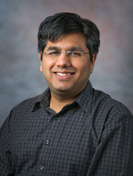I primarily look to supervise graduate EE students in the signals and systems area at Penn State. Additionally, students in computer Science, industrial engineering and applied mathematics may be candidates for my group depending on the intersection of your research background and interests with statistical signal processing.
Note:
I am primarily interested in working with Ph.D. students. However, I may choose to accept a strong MS student given the desire to continue for a PhD with me at Penn State. If MS is your ultimate goal, I can serve on your thesis committee given mutual interest but do not expect me to recruit you for my research group.
If you are interested in working with me, here's what you should do:
Get admitted to the graduate program at Penn State EE/CSE/IE
Correspond directly with the department and graduate studies office for this purpose. I will NOT be responsible for getting you admitted!- Via a short email, tell me about yourself (the past):
List the universities you have attended, including which departments you were in.
Give your cumulative GPA at each university; if your GPA is not on a 4 point or 10 point scale - please do NOT convert.
Send your resume - no more than 2 pages long (be sure to include your publications, relevant classes you have taken, and your grades in those classes).
Describe relevant research projects you have worked on. If you are currently an undergraduate student and have not worked on research projects outside the classroom, you may include relevant class projects you have worked on.
What country are you a citizen of?
If I respond, then in person or via another email, tell me about yourself (the future):
Look over my website (personal and lab) and peruse my research indulgences. Then comment on how your interests match up with mine. Note: write this up in the form of an essay, so I can judge your English writing ability.
Do you plan to obtain a Ph.D. degree? (I usually do not take students that just want a Master's degree).
Do you think you might be interested in becoming a professor after you earn your Ph.D.?
Of the topics that I work on, which do you think you are most likely to be interested in for your dissertation?
If all goes well, then you should know methods of working with a faculty (and specifically me)
There are several ways students can work with faculty. Below, I've listed them as four main phases (chronological steps). Generally, a student will progress through these four phases of support in chronological order, but exceptionally strong candidates may be able to progress immediately to a funded RA position. Students that are self-supported (e.g. through an industry employer or a branch of the government) may not require support, but will still need to make sufficient research and academic progress for me to remain as their academic advisor.
I like to work with students informally or for credit initially. This allows the student a chance to work on a real project and see if he or she likes a particular research area without making a long term commitment. If a student has worked with me for one or two semesters and has made sufficient research and academic progress, he or she may be appointed as a graduate research assistant (RA). Once a student has completed a year or two of courses and has made progress on a particular research topic, it may be possible to obtain a graduate fellowship (I can help with this).
Informal work
This is a "get acquainted" period. The student is not obligated to do any work; however, good progress made during this phase is required for the student to progress to the phases below. I give the student a well-defined (narrow scope) task and suggested reading list so that he or she can "get up the learning curve" rapidly and get some preliminary results. (If you are currently not funded or on a TA, this is a particularly good option.)Independent study for credit: EE 596
This involves a one semester commitment from the student, for which he or she receives academic credit towards a degree. The student and professor must agree in writing ahead of time as to what the expectations for the semester-long research effort are. (If you're a PhD student in the systems area looking to find an advisor, this may be your best option)RA appointment
Standard RA appointments are for 20 hours per week. The student receives a tuition waiver and a stipend. RA appointments directly support research grants, so there are often deliverables and milestones that must be attained. The RA work will usually be closely related to the student's research (dissertation) topic so that work performed for the RA will help the student progress towards graduation.Graduate fellowship
Graduate fellowships are very nice but also hard to obtain. They free the student from the constraints of RA funding in order to work exclusively on a dissertation topic. They also are noticed on resumes when it comes time to apply for a job. Fellowships can come from the University, industry, and government agencies. The national fellowships are particularly nice awards to receive. In general, students should have completed at least one year of graduate study before applying for these fellowships. The process of identifying an appropriate funding agency and developing a strong proposal can be difficult without the right guidance. I will work with students to develop a strong application packet for appropriate fellowship opportunities.
I have high expectations of my students, but I also strive to create an informal and friendly group atmosphere. Group meetings let us stay involved in each other's work and have a lively exchange of ideas, usually followed by lunch on me. :-)
